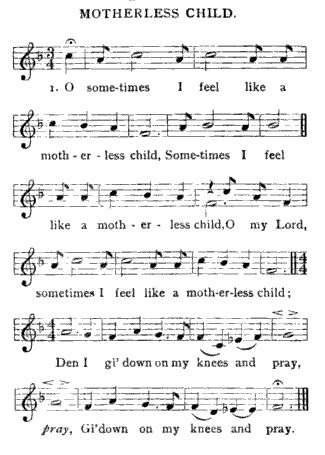Sometimes I Feel Like a Motherless Child

Original score of "Motherless Child" by William E. Barton, D.D., 1899.
"Sometimes I Feel Like a Motherless Child" (ya da basitçe "Motherless Child") geleneksel Negro spiritüeli.
Şarkı ABD'de kölelik döneminde yaygın olarak kölelerin çocuklarının ebeveynlerinden alınarak satıldığı zamana dayandığı bilinmektedir. Şarkının ile performansı Fisk Jubilee Singers'e dayanır.[1][2] pek çok geleneksel şarkı gibi bu şarkınında birçok versiyonu bulunmaktadır. Anan babasından koparılmış bir çocuğun umutsuzluğu tarif eder gibi açıkça acı ve çaresizliği ifade eder. Bir yorumunda, şarkıda sürekli tekrarlanan sometimes (bazen) kelimesi umutsuzluğun ölçüsünü bildirir, en azından "sometimes" I do not feel like a motherless child (bazen öksüz bir çocuk gibi hissetmiyorum) gibi anlaşılabilir.
Koro düzenlemeleri
- Geniş olarak beğenilen düzenleme 1918 yılında Harry T. Burleigh tarafından yazıldı.[1]
- Dimitri Tiomkin Home of the Brave (1949)isimli filmde bir melodi olarak kullandu.
- Pier Paolo Pasolini The Gospel According to St. Matthew (1964) isimli filmde kullandı.
Tanınmış versiyonları
- Paul Robeson, orijinal kaydı 1930'larda EMI tarafından yapılan Songs of Free Men (1997) albümünde ve Paul Robeson: The Complete EMI Sessions 1928-1939 (2008) albümünde yer aldı.
- Louis Armstrong'un Louis and the Good Book (1958) albümünde.
- Lou Rawls ve the Pilgrim Travelers tarafından The Soul Stirring Gospel Sound of the Pilgrim Travelers (1962) albümü için.
- Odetta'nın 8 Nisan 1960'da Carnegie Hall'de canlı performans kayıtlarını içeren "Odetta at Carnegie Hall" (1960) albümünde ve Pasolini'nin filmi "The Gospel According to St. Matthew" (1964)'de kullanıldı.
- Folk sanatçıları The Simon Sisters tarafından 1960'ların ortalarında
- Darlene Love covered part of it for the first part of the Gospel Medley in the Elvis Presley's '68 Comeback Special (1968)
- Jimmy Scott The Source (1969) isimli albümünde kullandı.
- Ike & Tina Turner tarafından 1969'da yapılan Outta Season isimli albümde cover şeklinde yer aldı.
- The Les Humphries Singers ilk albümleri Rock My Soulde kullandı.
- Richie Havens used lyrical elements of this piece in an improvised song at Woodstock Festival in 1969 when he ran out of songs to play after being called back for multiple encores.
- Boney M. ikinci albümü Love for salede kullandı.
- Van Morrison hem Poetic Champions Compose, hem deThe Best of Van Morrison Volume Two albümünde kullandı.
- Martin L. Gore, 1989'da Counterfeit e.p. albümünde kullandı.
- Crime and the City Solution, 1990'da Paradise Discotheque
- Charlie Haden ve Hank Jones, Steal Away: Spirituals, Hymns, and Folk Songs albümünde şarkıyı kullandı.
- Hootie & the Blowfish, 1994'de Cracked Rear View
- Kevin Eubanks, on Live at Bradley’s (1996, Blue Note) (1994)
- Tom Jones (accompanied by Portishead) on Reload (1999)
- The daughter character, Keesha, sang this piece in the play I Can Do Bad All By Myself, written by Tyler Perry (1999)
- Amy Jo Johnson, for the film "Sweetwater: A True Rock Story" (1999)
- Waterson on Matchbox Selection (2000)
- Under the name Lucky Pierre, Aidan Moffat used an operatic sample of the phrase "Sometimes I feel like a motherless child" on the track of the same name from his 2002 solo album Hypnogogia.
- John Legend on Solo Sessions Vol. 1: Live at the Knitting Factory (2005) and at the Hope for Haiti Now telethon (2010).[3]
- Wishbone Ash'in 2006'da yaptığı Clan Destiny albümünde.
- Ghostface Killah'in 1996'da yaptığı Ironman (album) albümünde.
- Wynton Marsalis tarafından trompet versiyonu Track 14: Traditional Spiritual Portrait of Wynton Marsalis, SONY Classical, 1989/92
- John Frusciante tarafından Hollywood Moguls'da 28 Mart 1997'de canlı performans olarak.
- Over the Rhine tarafından Live from Nowhere: Volume Three (2007) canlı bir performans kaydı.
- Eric Burdon, tarafından The Blue Hour (2007) filminde.
- Matthew Perryman Jones tarafından Swallow the Sea (2008) albümünde.
- Beth Nielsen Chapman, tarafından 2008'de derleme albüm, Song of Americada
- Loren Connors ve Suzanne Langille, 1987-89 (2000) albümünde.
- John Scofield tarafından Piety Street (2009) albümünde.
- Arms and Sleepers'in "The Motorist" (2009) albümünde.
- The Wailin' Jennys'in "Live At The Mauch Chunk Opera House" (2009) albümünde.
- Clutch'un "Strange Cousins from the West" (2009) albümünde.
- John Legend'in "Hope for Haiti Now: A Global Benefit for Earthquake Relief" (2010) albümünde.
- Mr. Blotto'nun "Blottopia X" 2009 albümünde.
- Sweet Honey in the Rock tarafından ...Twenty-Five... (1998) albümünde yer aldı.
Kaynaklar
- 1 2 "Blue Gene" Tyranny, "Sometimes I Feel Like a Motherless Child" article, Allmusic
- ↑ Barton, Hymns of the Slave and the Freedman, p.17 ("Not very long ago I attended a concert given by a troupe of jubilee singers, whose leader was a member of the original Fisk company. Toward the end of the programme he announced that a recently arrived singer in his troupe from Mississippi had brought a song that her grandparents sang in slave times, which he counted the saddest and most beautiful of song of slavery. It was a mutilated version of Aunt Dinah's song ['Motherless Child' or 'I feel like I'd never been borned.']")
- ↑ Jocelyn Vena, "'Hope For Haiti Now' Telethon Airs Tonight At 8 P.M.: George Clooney, Wyclef Jean and Hollywood's biggest names help raise money for earthquake relief." MTV News, January 22, 2010, found at MTV News. Accessed January 22, 2010.
Bibliyografi
- Barton, William E., D.D. "Hymns of the Slave and the Freedman" from Old Plantation Hymns with Historical and Descriptive Notes. Lamson, Woolffe and Company, 1899.
- Floyd, Samuel A., Jr. The Power of Black Music: Interpreting Its History from Africa to the United States. Oxford University Press, 1995. ISBN 0-19-508235-4
Dış bağlantılar
- Lyrics as by J. W. Johnson & J. R. Johnson (1926) at negrospirituals.com
- Art of the States: Piano Sonata No. 4 musical work quoting the spiritual by African-American composer George Walker
This article is issued from Vikipedi - version of the 12/20/2016. The text is available under the Creative Commons Attribution/Share Alike but additional terms may apply for the media files.